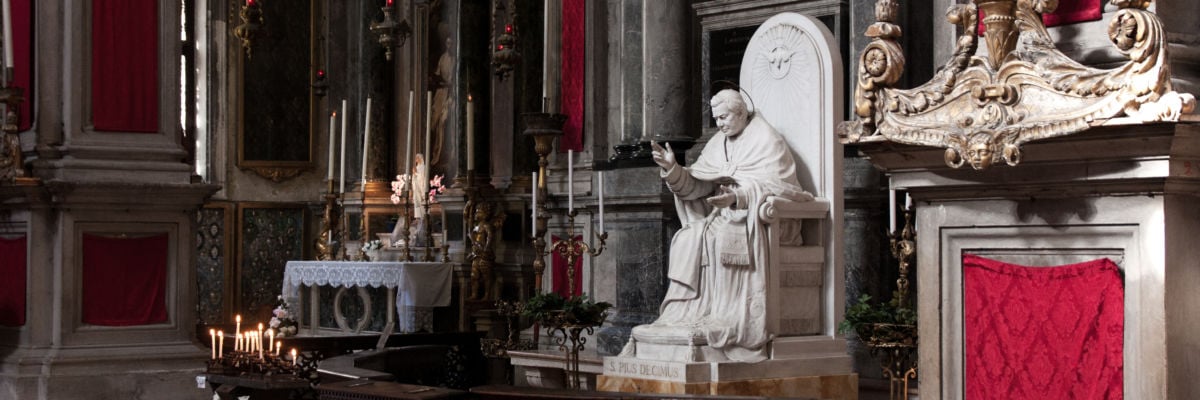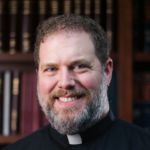
As a former Protestant minister, formed in the ecumenical and liturgical movements of the 20th century, I cannot help noticing certain things now that I’m Catholic.
I’m not talking about sacramental theology or canon law, but the subtleties of the Sunday lectionary. You see, many Protestants of a mainline or “high church” variety will hear the same Gospel read today—the Gospel when the Lord vests Peter with a particular kind of authority over his Church. Yet, predictably, the passage will either be ignored—for even its superficial elements may appear dangerous to the mind trained always to take the Bible literally—or interpreted in some general way as to avoid the way that the Catholic Church has always read it.
Those interpretations might include the idea that in singling out Peter, the Lord really meant to give his authority to all of the apostles. This would be more convincing if the Bible didn’t contain the passages in the Gospel of John, for example, where he does just that. They could also include the suggestion that the Lord’s gift of authority was merely temporary, something that died out after the first generation. This would be more convincing if it didn’t end up making Jesus look like a naïf who had no idea what his Church was going to look like in the future. Lastly, there is always that modern tendency to just arbitrarily declare that Jesus could have never said something like this, and so therefore it must be the later invention of that dangerous monster, the early “medieval” Catholic—and this just holds no water with serious scholarship.
But back to my comment on the lectionary. Outside the Catholic Church, those hearing this Gospel today will hear it paired with completely different passages from the Old Testament: either a continuous reading from Exodus that has nothing at all to do with it or a reading from later in Isaiah, which contains a more tenuous connection with the Messianic mission. This is what strikes me, as someone who has often preached through those same lectionaries: the reading that we hear, from Isaiah 22, makes an unmistakable connection between the keys that Christ gives Peter and the key of the royal steward in Isaiah.
I say unmistakable because the word key really doesn’t appear much in the Old Testament. It is not a common trope. We find it literally twice: once in Judges, referring to an actual key used to open a lock in the story, and then here in Isaiah, full of symbolism. The key of David is, on a literal level, the key to the royal chamber. The steward in question, one Shebna, is a corrupt leader who abuses the key for his own interests. He is the number-two authority in the kingdom, and he forgets what that authority is for. It seems that the symbol of the key on the shoulder was, historically, this person’s vesture of office. He controlled access to the king, effectively mediating the king’s justice, mercy, and favor.
When Jesus invokes this language in Matthew, ramping it up with the allusion to opening and shutting, binding and loosing, the implications are quite clear: this is the man who has his full authority. Even later rabbinical Jewish readings of the New Testament recognize the way that Jesus invokes the language of binding and loosing that was applied to the Pharisees and their successors. Like the ancient royal steward, the power rests in the office, not the person; it passes down from person to person. It is possible for someone to abuse the authority, but it is not possible for the authority just to go away because it is the authority of the king himself, God.
The kingdom of Israel was always understood to stand for the kingdom of God on earth. If you wanted to see the kingdom of God, you looked to the kingdom of Israel. Jesus ultimately applies this logic to himself: if you want to see the kingdom of God, you look to Jesus. But through this passage in Matthew, it is also clear that if you want to look to Jesus, you also have to look to Peter, because he has the keys.
This doesn’t mean, in some simplistic or superstitious way, that Peter, or the Petrine ministry, is directly responsible for the salvation of each and every soul. The pope doesn’t have to personally baptize each Christian. He is not the mediator of all grace—that title, actually, belongs more appropriately to Our Lady, which is a subject for another time. But he is the visible, personal guarantee that the faith we hold and profess is the faith once delivered to the saints.
Jesus did not, in fact, leave us a code of rules covering every possible scenario in life. He did send us the Holy Spirit. But the Spirit, we always have to remember, is not some freewheeling independent force of chaos. The Spirit always unites us with the Son, so the Son is the ultimate judgment about what is and what isn’t of the Spirit. That judgment the Son has given to Peter and his successors.
The power of the keys, which is a direct reference to the royal power in Isaiah 22, takes on a further layer of meaning in the Church’s liturgical imagination. Consider one of the “great O” antiphons leading up to Christmas:
O Key of David, and Sceptre of the house of Israel; that openest, and no man shutteth; and shuttest and no man openeth: Come, and bring the prisoner out of the prison-house, and him that sitteth in darkness, and the shadow of death.
You’ll recognize the language paraphrased in one of the verses of “O come O come Emmanuel.” Here, Christ himself is the key. He is the key to heaven and hell. He is the key to renewed creation. He is the key to the path of light leading out from the darkness of sin and death. So to say that Peter and his successors hold the power of the keys is not to say that they hold some kind of intrinsic divine power but that Christ, the true key, has given himself to them in trust. They hold the key because they hold Christ—because he has given himself for them to hold.
We can say that every bishop and every priest holds Christ—literally in his hands when he offers the Holy Sacrifice. We can also say that every baptized person holds Christ—by receiving him in Holy Communion into our souls and bodies, by cultivating Christ’s life within us as the seed of our baptism grows into maturity. There is one Lord Jesus Christ, and one Holy Spirit, but he distributes his life to us in different ways. Just as it is the privilege, gift, and responsibility, of the priest to hold in his hands the sacramental body, for the sake of the ecclesial body, so it is the privilege, gift, and responsibility of the pope to hold in his hands and in his voice Christ’s own authority to bind and to loose. Like Shebna in Isaiah 22, he will answer for that authority on the Day of Judgment.
The pope’s authority is personal, but the Petrine office is not at the same time a personality. We err if we imagine that everything this or that pope says is somehow the word of God. Not so. That impression has arisen sometimes in the faithful, especially in this last century of mass communication and, for the most part, very holy popes. But history has seen some very bad popes as well as some very good popes, and it is essential that we separate in our minds the authority of the office and the holiness, or lack of holiness, of its occupant.
The divine judgment of Shebna in Isaiah 22, and the Lord’s promise to Peter in Matthew 16, should leave us with the reminder that ultimately, God is in charge.
The papacy is a gift for us. It is the gift of visible unity. That is a prize beyond reckoning. To truly receive this gift, though, requires that we look beyond it—much as we look beyond the visible form of the sacraments—toward its purpose and meaning, which are union with Christ. The point of the pope is that the pope should not be the interesting part of the Church. He opens the door. We don’t need to obsess over this or that doorkeeper and what he’s done right or wrong. We just need to go in and worship the King.



